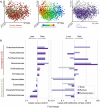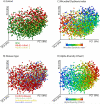The treatment-naive microbiome in new-onset Crohn's disease
- PMID: 24629344
- PMCID: PMC4059512
- DOI: 10.1016/j.chom.2014.02.005
The treatment-naive microbiome in new-onset Crohn's disease
Abstract
Inflammatory bowel diseases (IBDs), including Crohn's disease (CD), are genetically linked to host pathways that implicate an underlying role for aberrant immune responses to intestinal microbiota. However, patterns of gut microbiome dysbiosis in IBD patients are inconsistent among published studies. Using samples from multiple gastrointestinal locations collected prior to treatment in new-onset cases, we studied the microbiome in the largest pediatric CD cohort to date. An axis defined by an increased abundance in bacteria which include Enterobacteriaceae, Pasteurellacaea, Veillonellaceae, and Fusobacteriaceae, and decreased abundance in Erysipelotrichales, Bacteroidales, and Clostridiales, correlates strongly with disease status. Microbiome comparison between CD patients with and without antibiotic exposure indicates that antibiotic use amplifies the microbial dysbiosis associated with CD. Comparing the microbial signatures between the ileum, the rectum, and fecal samples indicates that at this early stage of disease, assessing the rectal mucosal-associated microbiome offers unique potential for convenient and early diagnosis of CD.
Copyright © 2014 Elsevier Inc. All rights reserved.
Figures





Comment in
-
Microbiome: bacterial imbalance in Crohn's disease.Nat Rev Microbiol. 2014 May;12(5):312. doi: 10.1038/nrmicro3255. Epub 2014 Mar 17. Nat Rev Microbiol. 2014. PMID: 24638106 No abstract available.
-
IBD. Understanding gut microbiota in new-onset Crohn's disease.Nat Rev Gastroenterol Hepatol. 2014 May;11(5):268. doi: 10.1038/nrgastro.2014.45. Epub 2014 Mar 25. Nat Rev Gastroenterol Hepatol. 2014. PMID: 24662277 No abstract available.
-
Gut microbiome in new-onset Crohn's disease.Gastroenterology. 2014 Oct;147(4):932-4. doi: 10.1053/j.gastro.2014.08.014. Epub 2014 Aug 23. Gastroenterology. 2014. PMID: 25152198 No abstract available.
References
-
- Chao A, Chazdon RL, Colwell RK, Shen TJ. Abundance-based similarity indices and their estimation when there are unseen species in samples. Biometrics. 2006;62:361–371. - PubMed
-
- Chavan RS, Pannaraj PS, Luna RA, Szabo S, Adesina A, Versalovic J, Krance RA, Kennedy-Nasser AA. Significant morbidity and mortality attributable to rothia mucilaginosa infections in children with hematological malignancies or following hematopoietic stem cell transplantation. Pediatr Hematol Oncol. 2013;30:445–454. - PubMed
Publication types
MeSH terms
Grants and funding
LinkOut - more resources
Full Text Sources
Other Literature Sources
Medical
Molecular Biology Databases
